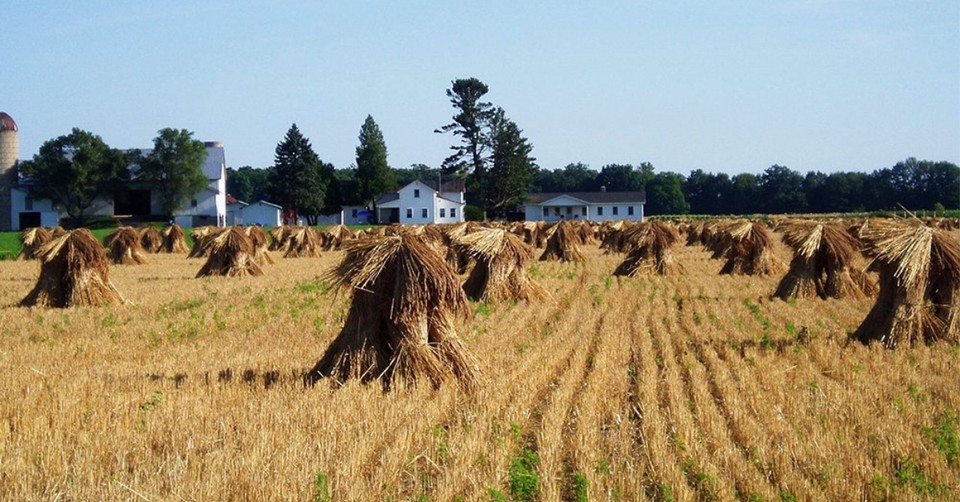What Is Holy Monday and Why is It Significant?

In many discussions about the week before Easter, Holy Monday gets short notice. It’s after the big day where Jesus was greeted with palm leaves; it’s before the day where Judas agreed to betray him and all the vivid events that take place from the Last Supper onward. However, the Bible has a lot to say about the day, and it really helps us understand the rest of the Passion story.
What Is Holy Monday?
Holy Monday is the second day of Holy Week, right after Palm Sunday. It is the second day that Jesus was in Jerusalem, and the Bible records him giving a variety of teachings and debating the religious leaders over Holy Monday and the next day (Holy Tuesday).
Get your FREE Holy Week Guide Here. Receive encouragement straight to your inbox.
What Happened on Holy Monday in Scripture?
Sometimes different Gospels record events happening on different days. Matthew 21:12-17 and Luke 19:45-48 describe Jesus clearing the temple on Palm Sunday. Mark 11 says Jesus came to Jerusalem on Sunday, went to the temple, and “after looking around carefully at everything, he left because it was late in the afternoon” (Mark 11:11), then cleared the temple on Holy Monday (Mark 11:15-18).
A similar problem comes with the teaching that Jesus did in Jerusalem. Mark 11:20-13:17 describes Jesus going back to Bethany after clearing the temple and doing the teaching and debates on Holy Tuesday. Matthew 22-25 describes these teaching and debates without making it clear if Jesus did it all on one day or over two days. The closest Matthew gets to giving a timeline is saying that Jesus spoke with the Sadducees about marriage “on the same day” (Matthew 22:23) he told three parables and talked about taxes.
The other two Gospels don’t really clear this up. Luke says that Jesus “taught daily in the Temple” (Luke 19:47) and that “one day as Jesus was teaching” the religious leaders asked what authority he had (Luke 20:1-2), not making it clear which specific days these events happened on. John doesn’t include these “teaching and debate” moments at all.
To make things simple, here is the miracle that Matthew and Mark agree happened on Holy Monday, followed by what Jesus did on either Holy Monday or Holy Tuesday:
While walking from Bethany to Jerusalem, Jesus saw a fig tree with no fruit. He cursed the fig tree, which either immediately withered (Matthew 21:19-22) or the disciples noticed it had withered when they passed it the next day (Mark 11:20-25). Either way, Jesus used the opportunity to tell the disciples that if they had enough faith, they could not only tell a fig tree to wither, they could tell mountains to move (Matthew 21:20-22) (Mark 11:23).
After Jesus cleared the temple, religious leaders asked Jesus questions to trick him. They asked what authority he had, and Jesus replied by asking them what authority John the Baptist had (Matthew 21:23-28) (Mark 11:27-31) (Luke 20:1-8). When they asked Jesus whether it was proper to pay Roman taxes, he told them, “give to Caesar what is Caesar’s and to God what is God’s” (Matthew 22:15-22) (Mark 12:13-17) (Luke 20:20-26). The Sadducees asked him about marriage at the final resurrection (which they didn’t believe in) and Jesus replied that in the age to come people would not be married or marry (Matthew 22:23-33) (Mark 12:-18-34) (Luke 27:-40). Then the Pharisees asked Jesus for the greatest commandment, Jesus said it was “love the Lord your God with all your heart, all your soul, and all your mind,” and that the second greatest was to “love your neighbor as yourself” (Mathew 22:34-40).
In between these debates, Jesus taught people, asking whose son they believed the Messiah was (Matthew 22:41-46) (Mark 12:35-37) (Luke 20:41-44) and warned about corrupt teachers (Matthew 23:1-36) (Mark 12:38-40) (Luke 20:45-47).
In his teaching, Jesus told parables about two sons (Matthew 21:28-32), evil farm tenants (Matthew 21:33-46) (Mark 12:1-12) (Luke 20:9-19), and a king who gave a great feast (Matthew 22:1-14).
After praising a widow for giving all she had as an offering (Mark 12:41-44) (Luke 21:1-4), Jesus noted his disciples looking around at Jerusalem and gave an apocalyptic message about the future (Matthew 24:1-51) (Mark 13:137) (Luke 21:5-36).
Jesus followed this warning by telling parables about 10 bridesmaids waiting for the bridegroom (Matthew 25:1-30), and about three servants showing their master what they did with what they were given (Matthew 25:14-30).
Jesus then told a story about how God will respond to people at the final judgment (Matthew 25:31-46). He ended the day by telling the disciples he would be crucified in two days (Matthew 26:1-2).
Why Holy Monday is Significant
There are many important things to observe about Holy Monday, but two are particularly important.
First, Holy Monday set up the events which happened on Maundy Thursday. By clearing the temple, Jesus criticized the leaders who allowed and promoted the activity happening in the temple. His teachings rebuked the religious leaders overtly (particularly by telling people to watch out for corrupt leaders), and by telling a parable meant to criticize them. Matthew 21:45-46 explains that the leaders knew they were the “evil farm tenants” that Jesus mentioned in that parable. The religious leaders had been concerned about Jesus before this, but his actions on Holy Monday and Holy Tuesday clinched it: they wanted him dead.
Second, Jesus describes these teachings and parables as being about the kingdom of God. They use different images and words but are all about two ideas: God will offer the kingdom to unexpected people, and when the kingdom arrives in full there will be judgment.
The parable of the two sons, the evil farm tenants, and the great feast all deal with God offering the kingdom to people and varying responses, which results in God offering it to others. The son who initially does not obey the father is ultimately honored for doing what he’s asked in the end, and Jesus ends it by telling the religious leaders, “I tell you the truth, corrupt tax collectors and prostitutes will get into the Kingdom of Heaven before you do” (Matthew 21:31). The evil farm tenants ultimately lose the farm, which the landlord gives to others (Matthew 21:22). The king invites many to his great feast, when many do not take him up on his offer he seeks others to attend.
The parables of the servants and the ten bridesmaids describe people given things for a time to come (the bridegroom’s approach, the master’s return). Some of these people wisely use what they were given (the oil, the money). Others do not. There is a coming event to be prepared for.
The apocalyptic discussion about Jerusalem (possibly referring to the city’s fall in A.D. 70, possibly talking about the end days) and the story about God’s response to people at the final judgment both highlight the idea that something unexpected is coming. Therefore, people needed to consider what they did with the time they were given.
On one of his last days before his death, Jesus warned people that the kingdom of God was coming. Not only that, but he warned them that the way they understood the kingdom of God had to change.
What Are the Other Days of Holy Week?
There’s a lot of information in the Gospels about the week Jesus spent in and around Jerusalem leading up to his crucifixion. Some people have observed that really the Gospels aren’t conventional biographies, because they don’t tell us Jesus’ life with equal emphasis on each period: we get a little about Jesus’ birth, a selection of stories about his ministry years, and then we get the most details when it comes to the last week of Jesus’ natural life on earth. Holy Week is in a sense the center of the Gospels.
With that in mind, here’s a simple overview of what the eight days of Holy Week are:
On Palm Sunday, Jesus entered Jerusalem (Matthew 21:1-7) (Mark 11:1-14) (Luke 19:28-40) (John 12:12-19).
On Holy Monday, Jesus did a miraculous event, and may have cleared the temple and taught in Jerusalem.
On Holy Tuesday, Jesus continued teaching in Jerusalem, including telling the disciples that he would be crucified in two days (Matthew 26:1-2) (John 12:20-36).
On Holy Wednesday (or Spy Wednesday), Jesus was anointed with oil and rebuked Judas for criticizing the woman who anointed him (Matthew 26:6-13) (Mark 12:1-9) (John 12:1-7). Judas met with the priests that night and agreed to betray Jesus (Matthew 26:14-16) (Mark 14:10-11) (Luke 22:1-6).
On Maundy Thursday, Jesus held the Last Supper (Matthew 26:17-35) (Mark 14:12-42) (Luke 22:7-28) (John 13:1-17:26) and was arrested in Gethsemane (Matthew 26:36-56) (Mark 14:42-52) (Luke 22:39-53) (John 18:1-10). That night, the authorities condemned Jesus for blasphemy (Matthew 26:57-67) (Mark 14:53-65) (Luke 22:66-71) (John 18:19-24)). The same night, Peter denied Jesus three times (Matthew 26:69-75) (Mark 14:66-72) (Luke 22:54-65) (John 18:15-27).
On Good Friday, Jesus was sent to Pilate and King Herod (Matthew 27:1-26) (Mark 15:1-21) (Luke 23:1-25) (John -18:28-19:16), then crucified and buried (Matthew 27:32-55) (Mark 15:21-47) (Luke 23:26-54) (John 19: 17-42).
On Holy Saturday Jesus was lying in the tomb, and the religious leaders asked Pilate to post guards and seal it (Matthew 27:62-65). That evening, several women bought spices to make a burial anointment (Mark 16:1).
On Easter Sunday, the woman came to the tomb and discovered Jesus had risen from the dead (Matthew 28:1-15) (Mark 16:2-11) (Luke 24:1-53) (John 20:1-23).
Related Resource: A Prayer for Easter Peace and Promise
No matter how helpless or overwhelmed you feel with life, remember that God promises peace in our relationship with Him and that we have the hope of heaven. - Heidi Vegh
Photo credit: RNS/Tom Markoski/Pixabay/Creative Commons

This article is part of our larger Holy Week and Easter resource library centered around the events leading up to the death and resurrection of Jesus Christ. We hope these articles help you understand the meaning and story behind important Christian holidays and dates and encourage you as you take time to reflect on all that God has done for us through his son Jesus Christ!
What is Lent? It's Meaning and Why We Celebrate
When is Lent? When Does Lent Start and End?
What is the Meaning Ash Wednesday?
What is Holy Week?
What Is the Meaning of Palm Sunday?
What is the Meaning of Holy Monday?
What is Maundy Thursday?
What Is Good Friday and Why is it Good?
Good Friday Prayer
What Does Holy Saturday Mean?
What Is the Easter?
Easter Prayers
Powerful Facts About the Cross of Jesus
Originally published February 15, 2024.





